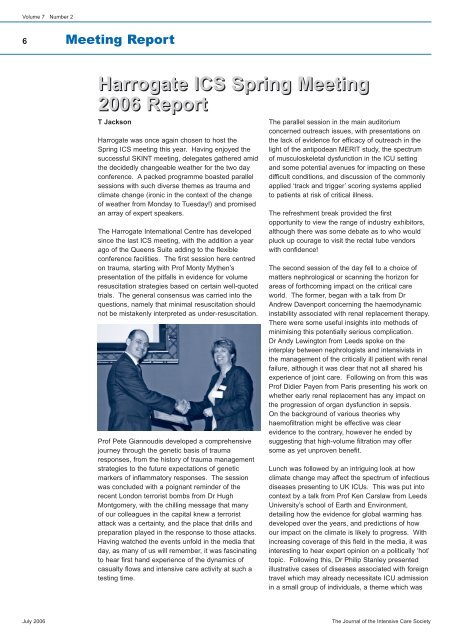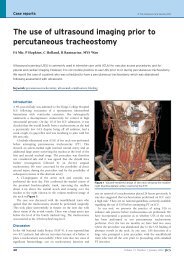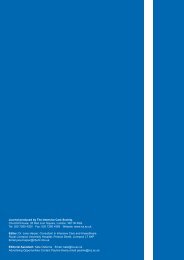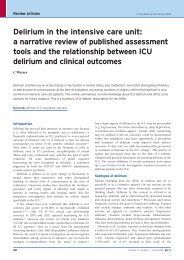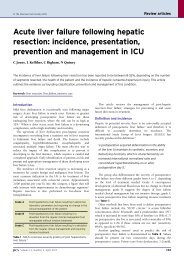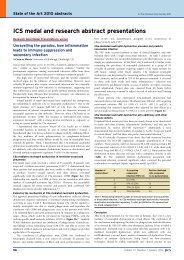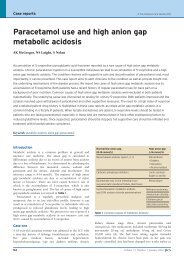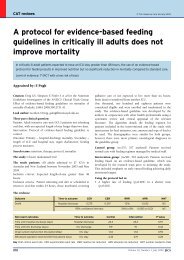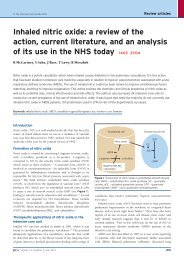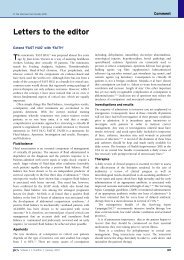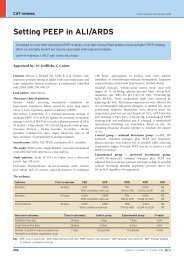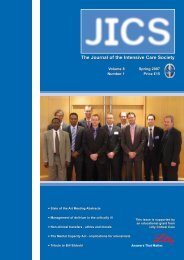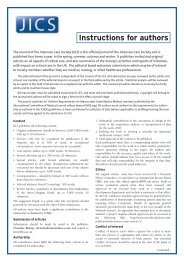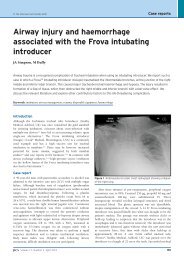Volume 7 Number 2 July 2006 - JICS - The Intensive Care Society
Volume 7 Number 2 July 2006 - JICS - The Intensive Care Society
Volume 7 Number 2 July 2006 - JICS - The Intensive Care Society
Create successful ePaper yourself
Turn your PDF publications into a flip-book with our unique Google optimized e-Paper software.
<strong>Volume</strong> 7 <strong>Number</strong> 2<br />
6<br />
Meeting Report<br />
Harrogate ICS Spring Meeting<br />
<strong>2006</strong> Report<br />
T Jackson<br />
Harrogate was once again chosen to host the<br />
Spring ICS meeting this year. Having enjoyed the<br />
successful SKINT meeting, delegates gathered amid<br />
the decidedly changeable weather for the two day<br />
conference. A packed programme boasted parallel<br />
sessions with such diverse themes as trauma and<br />
climate change (ironic in the context of the change<br />
of weather from Monday to Tuesday!) and promised<br />
an array of expert speakers.<br />
<strong>The</strong> Harrogate International Centre has developed<br />
since the last ICS meeting, with the addition a year<br />
ago of the Queens Suite adding to the flexible<br />
conference facilities. <strong>The</strong> first session here centred<br />
on trauma, starting with Prof Monty Mythen’s<br />
presentation of the pitfalls in evidence for volume<br />
resuscitation strategies based on certain well-quoted<br />
trials. <strong>The</strong> general consensus was carried into the<br />
questions, namely that minimal resuscitation should<br />
not be mistakenly interpreted as under-resuscitation.<br />
Prof Pete Giannoudis developed a comprehensive<br />
journey through the genetic basis of trauma<br />
responses, from the history of trauma management<br />
strategies to the future expectations of genetic<br />
markers of inflammatory responses. <strong>The</strong> session<br />
was concluded with a poignant reminder of the<br />
recent London terrorist bombs from Dr Hugh<br />
Montgomery, with the chilling message that many<br />
of our colleagues in the capital knew a terrorist<br />
attack was a certainty, and the place that drills and<br />
preparation played in the response to those attacks.<br />
Having watched the events unfold in the media that<br />
day, as many of us will remember, it was fascinating<br />
to hear first hand experience of the dynamics of<br />
casualty flows and intensive care activity at such a<br />
testing time.<br />
<strong>The</strong> parallel session in the main auditorium<br />
concerned outreach issues, with presentations on<br />
the lack of evidence for efficacy of outreach in the<br />
light of the antipodean MERIT study, the spectrum<br />
of musculoskeletal dysfunction in the ICU setting<br />
and some potential avenues for impacting on these<br />
difficult conditions, and discussion of the commonly<br />
applied ‘track and trigger’ scoring systems applied<br />
to patients at risk of critical illness.<br />
<strong>The</strong> refreshment break provided the first<br />
opportunity to view the range of industry exhibitors,<br />
although there was some debate as to who would<br />
pluck up courage to visit the rectal tube vendors<br />
with confidence!<br />
<strong>The</strong> second session of the day fell to a choice of<br />
matters nephrological or scanning the horizon for<br />
areas of forthcoming impact on the critical care<br />
world. <strong>The</strong> former, began with a talk from Dr<br />
Andrew Davenport concerning the haemodynamic<br />
instability associated with renal replacement therapy.<br />
<strong>The</strong>re were some useful insights into methods of<br />
minimising this potentially serious complication.<br />
Dr Andy Lewington from Leeds spoke on the<br />
interplay between nephrologists and intensivists in<br />
the management of the critically ill patient with renal<br />
failure, although it was clear that not all shared his<br />
experience of joint care. Following on from this was<br />
Prof Didier Payen from Paris presenting his work on<br />
whether early renal replacement has any impact on<br />
the progression of organ dysfunction in sepsis.<br />
On the background of various theories why<br />
haemofiltration might be effective was clear<br />
evidence to the contrary, however he ended by<br />
suggesting that high-volume filtration may offer<br />
some as yet unproven benefit.<br />
Lunch was followed by an intriguing look at how<br />
climate change may affect the spectrum of infectious<br />
diseases presenting to UK ICUs. This was put into<br />
context by a talk from Prof Ken Carslaw from Leeds<br />
University’s school of Earth and Environment,<br />
detailing how the evidence for global warming has<br />
developed over the years, and predictions of how<br />
our impact on the climate is likely to progress. With<br />
increasing coverage of this field in the media, it was<br />
interesting to hear expert opinion on a politically ‘hot’<br />
topic. Following this, Dr Philip Stanley presented<br />
illustrative cases of diseases associated with foreign<br />
travel which may already necessitate ICU admission<br />
in a small group of individuals, a theme which was<br />
<strong>July</strong> <strong>2006</strong><br />
<strong>The</strong> Journal of the <strong>Intensive</strong> <strong>Care</strong> <strong>Society</strong>


